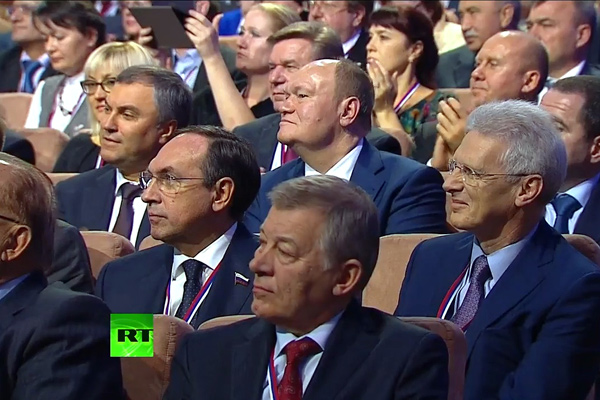The forum’s participants discussed the status of teachers, values and the quality of public education in Russia.

On October 14-15 the Russian Popular Front (ONF) public movement held in Penza the forum “Quality Education for the Country’s Good”, which attracted more than 500 participants. They included teachers, heads of universities and schools, parents, representatives of public organizations, specialists and heads of government ministries and departments, members of the State Duma and Public Chamber. Chairman of the State Duma Education Committee, Dean of the School of Public Administration and Chairman of the Russkiy Mir Foundation Management Board Vyacheslav Nikonov also took part in the event. In his remarks he emphasized the need to develop new programs for professional specializations which are in demand in the modern economy.
The forum had five discussion platforms on the following topics: The Teacher’s Mission and Status: The Modern Teacher and Challenges for Society; National Education Values: The Upbringing and Formation of the Russian Identity; Accessible Education for All; Education Quality in Russia: Degradation or Development; and, The New Economic Development Agenda: Educational Needs.
On October 15 during the plenary session of the forum Russian President Vladimir Putin spoke and fielded many questions from the participants.
Representatives of academic and educational organizations presented approximately 70 proposals for reforming the current educational system as well as the process of the formation of the person qualities of children at educational institutions. One of proposals, which the teachers personally presented to Vladimir Putin during the discussion on National Education Values: The Upbringing and Formation of the Russian Identity, was the idea of creating a national strategy for upbringing the Russian identity. According to the teachers, it is necessary to outline the clear criteria for the patriotic upbringing and the formation of civil, regional and confessional self-identity of Russian citizens.
“We are prepared to support and discussion proposals on this topic. On the whole they could help form the basis for a concept of civil identity,” Vyacheslav Nikonov told journalists, commenting on this proposal.
One of the key themes of the discussion at the forum was amendments to the federal law on education. According to Nikonov, the law is in need of specific pin-point improvements related to the proposals elaborated at the forum.
“Today we cannot categorically reject the existing law. It is effective but also in need of a few targeted corrections. And the ideas which today are being voiced by teachers can be formulated into specific amendments,” he explained.
Editorial department of the Russkiy Mir portal

 On October 14-15 the Russian Popular Front (ONF) public movement held in Penza the forum “Quality Education for the Country’s Good”, which attracted more than 500 participants. They included teachers, heads of universities and schools, parents, representatives of public organizations, specialists and heads of government ministries and departments, members of the State Duma and Public Chamber. Chairman of the State Duma Education Committee, Dean of the School of Public Administration and Chairman of the Russkiy Mir Foundation Management Board Vyacheslav Nikonov also took part in the event. In his remarks he emphasized the need to develop new programs for professional specializations which are in demand in the modern economy.
On October 14-15 the Russian Popular Front (ONF) public movement held in Penza the forum “Quality Education for the Country’s Good”, which attracted more than 500 participants. They included teachers, heads of universities and schools, parents, representatives of public organizations, specialists and heads of government ministries and departments, members of the State Duma and Public Chamber. Chairman of the State Duma Education Committee, Dean of the School of Public Administration and Chairman of the Russkiy Mir Foundation Management Board Vyacheslav Nikonov also took part in the event. In his remarks he emphasized the need to develop new programs for professional specializations which are in demand in the modern economy.





